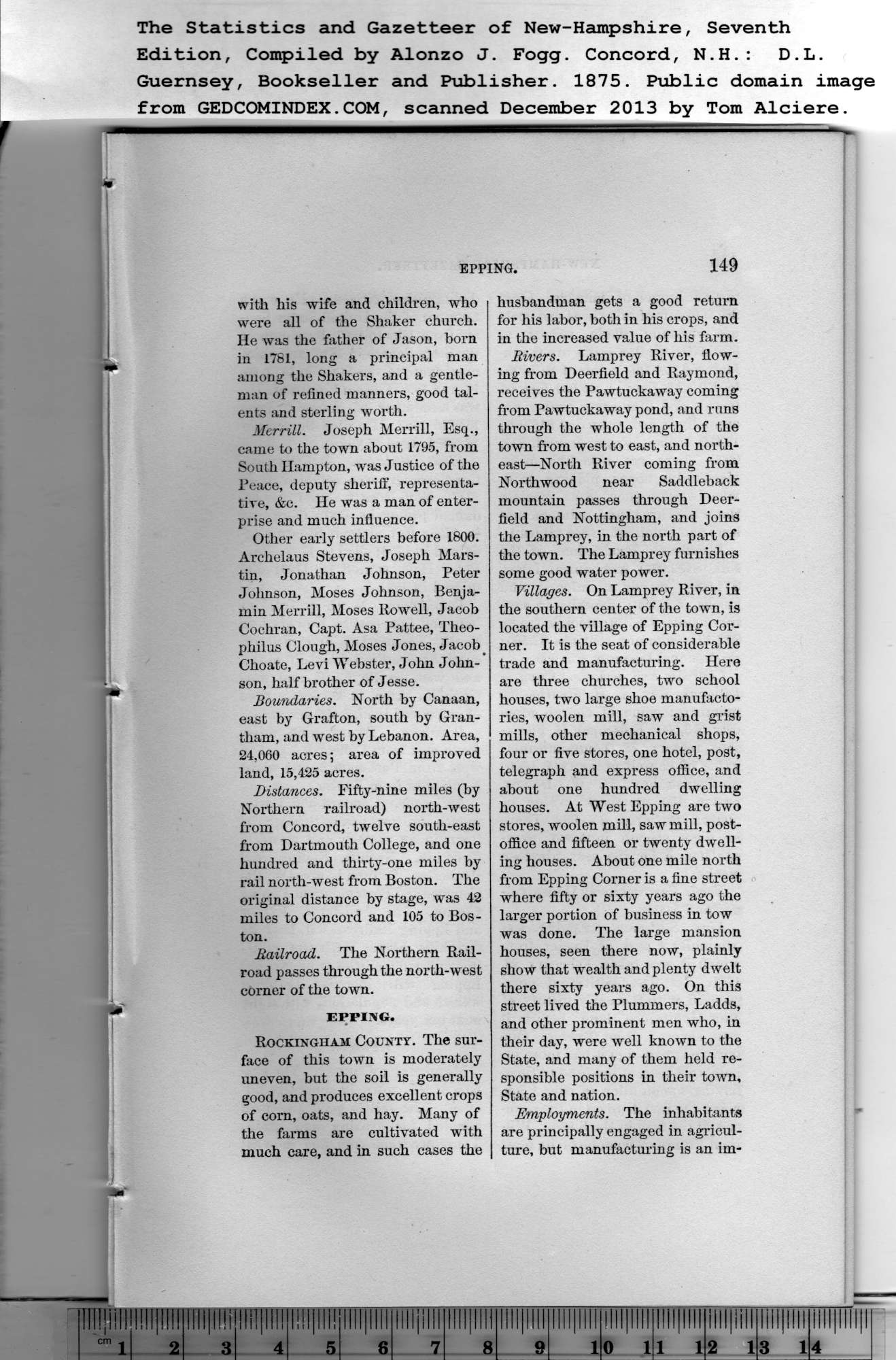|
with his wife and children, who
were all of the Shaker church.
He was the father of Jason, born
in 1761, long a principal man
among the Shakers, and a gentle-
man of refined manners, good tal-
ents and sterling worth.
Merrill. Joseph Merrill, Esq.,
came to the town about 1795, from
South Hampton, was Justice of the
Peace, deputy sheriff, representa-
tive, &e. He was a man of enter-
prise and much influence.
Other early settlers before 1800.
Archelaus Stevens, Joseph Mars-
tin, Jonathan Johnson, Peter
Johnson, Moses Johnson, Benja-
min Merrill, Moses Rowell, Jacob
Cochran, Capt. Asa Pattee, Theo-
philus Clough, Moses Jones, Jacob
Choate, Levi Webster, John John-
son, half brother of J esse.
Boundaries. North by Canaan,
east by Grafton, south by Gran-
tham, and west by Lebanon. Area,
24,060 acres; area of improved
land, 15,425 acres.
Distances. Fifty-nine miles (by
Northern railroad) north-west
from Concord, twelve south-east
from Dartmouth College, and one
hundred and thirty-one miles by
rail north-west from Boston. The
original distance by stage, was 42
miles to Concord and 105 to Bos-
ton.
Railroad. The Northern Rail-
road passes through the north-west
comer of the town.
EPPING.
Rockingham County. The sur-
face of this town is moderately
uneven, but the soil is generally
good, and produces excellent crops
of corn, oats, and hay. Many of
the farms are cultivated with
much care, and in such cases the
husbandman gets a good return
for his labor, both in his crops, and
in the increased value of his farm. |
Rivers. Lamprey River, flow-
ing from Deerfield and Raymond,
receives the Pawtuckaway coming
from Pawtuckaway pond, and runs
through the whole length of the
town from west to east, and north-
east—North River coming from
Northwood near Saddleback
mountain passes through Deer-
field and Nottingham, and joins
the Lamprey, in the north part of
the town. The Lamprey furnishes
some good water power.
Villages. On Lamprey River, in
the southern center of the town, is
located the village of Epping Cor-
ner. It is the seat of considerable
trade and manufacturing. Here
are three churches, two school
houses, two large shoe manufacto-
ries, woolen mill, saw and grist
mills, other mechanical shops,
four or five stores, one hotel, post,
telegraph and express office, and
about one hundred dwelling
houses. At West Epping are two
stores, woolen mill, saw mill, post-
office and fifteen or twenty dwell-
ing houses. About one mile north
from Epping Corner is a fine street
where fifty or sixty years ago the
larger portion of business in tow
was done. The large mansion,
houses, seen there now, plainly
show that wealth and plenty dwelt
there sixty years ago. On this
street lived the Plummers, Ladds,
and other prominent men who, in
their day, were well known to the
State, and many of them held re-
sponsible positions in their town.
State and nation.
Employments. The inhabitants
are principally engaged in agricul-
ture, but manufacturing is an im- |
